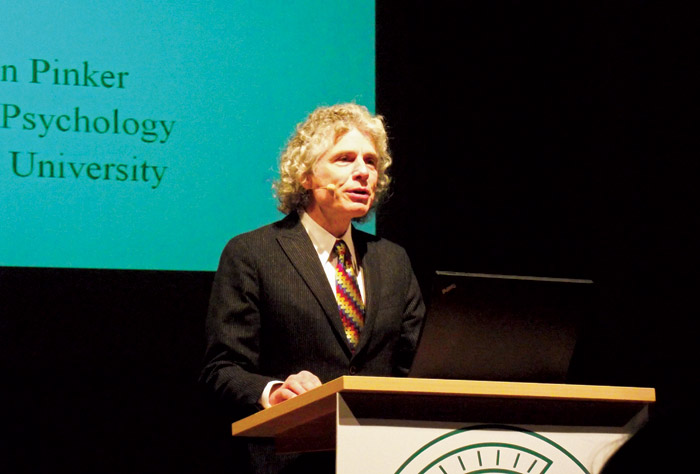Since the invention of the printing press, news media has endeavoured to employ capitation in the interest of magnetizing readers into ratifying their viewpoints and escalating their market share. The McGill Tribune is no exception, as the paper employs strategic readership engagement tactics in order to endue its student body readership with information, material, and divertissement.
Wait, what? That’s the question Harvard professor Steven Pinker asks in The Sense of Style, his latest book related to psycholinguistics. Pinker’s previous book, 1994’s influential The Language Instinct, stated that despite widespread disagreement, our collective language and grammar skills are not devolving, which Pinker, in Sense, reaffirms: Writing is not getting worse—it’s always been bad.
Pinker believes his new book can help. He was introduced to a number of adulations last Friday at a lecture organized by the McGill Writing Centre: A professor at Harvard, one of Prospect and Foreign Policy magazines’ top 100 public intellectuals, one of TIME’s top 100 influential people, and a prolific and popular author. It is this last distinction, however, that really gives Pinker the authority to write about writing; a boastful blurb from The Economist on Sense claims that Pinker writes “like an angel.” Last week’s public lecture gave students the opportunity to see if he speaks like one, too.
Pinker, after acknowledging his connection to McGill—BA Psychology, 1976—in a lecture hall that, according to him, “hasn’t changed in 40 years,” abruptly dove into Sense. The “curse of knowledge,” as Pinker calls it, is a significant cause of bad writing. According to Pinker, contrary to popular belief, writers today aren’t deliberately obscure, nor has their craft been dumbed down by the internet. Instead, Pinker says, bad writing is the difficulty in imagining what it is like for someone else not to know something that the writer knows, because people often project their knowledge, however specific, onto others.
What is to be done about this? Pinker sees some value in traditional ‘prescriptivist’ guides, such as the classic 1959 The Elements of Style by William Strunk and E.B. White. Furthermore, he claims that he doesn’t have the desire, to say nothing of the ability, to supplant The Elements of Style. However, Sense reflects Pinker’s wish for a 21st century style guide.
“[The book uses] the science and scholarship of language, […] modern grammatical theory, […] evidence-based dictionaries, research in cognitive science on what makes sentences easy or hard to read, and historical and critical studies of usage,” Pinker said.
Drawing from these areas has led Pinker to believe that a good model for writing is the so-called ‘classic style’: Simple and concise prose that does away with elaborate filler and meta examination of its subject—the introduction to this article, for example—responsibility-shifting passive voice, and hedging without much opposition. Classic style instead makes liberal use of example, and invites the reader to gaze out of “a window unto the world” through which the writer points directly to topics they are trying to explain, and does so neither by confusing the reader nor insulting their intelligence.
According to Dr. Sue Laver, director of the McGill Writing Centre, The Elements of Style is no longer assigned to McGill undergraduates. Much of the praise for the guide has stemmed from its concise precision; the book heeds its own advice to “omit needless words.” Writing is hard, however, and poor prose has spawned a whole curriculum of courses at McGill to improve writing—and has frustrated Stephen Pinker enough that he felt the need for a new style bible. Brevity and clarity have always been fashionable, but there is no doubt that The Sense of Style will inspire more ink to be spilled on how to write less.









